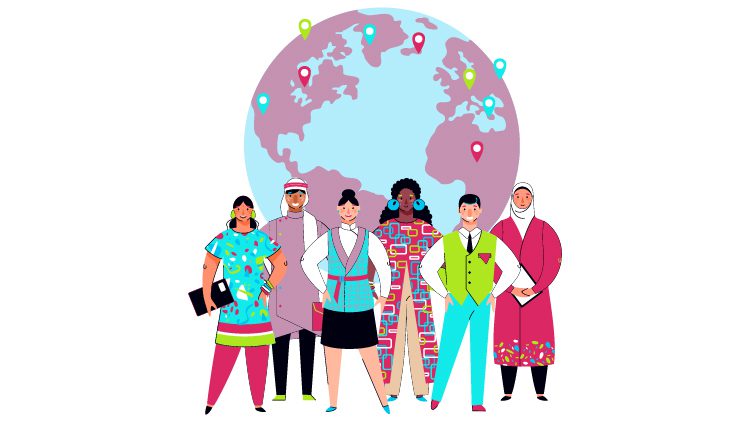
Why Connection of Cultures Matters
Understanding Cultural Diversity
Cultural diversity is the range of cultures and ethnicities within a society or community. It encompasses the various beliefs, customs, languages, traditions, and values of other groups of natural persons. In today’s interconnected world, understanding cultural diversity has become increasingly important. You’ll get all information about the connections of cultures.
By understanding cultural diversity, we can broaden our horizons and gain a deeper appreciation for the different perspectives and experiences of others. It allows us to step outside our cultural bubble and learn from different cultures’ wealth of knowledge and wisdom.
Cultural differences can sometimes lead to misunderstandings or conflicts, but we can foster stronger relationships with people from different cultural backgrounds by seeking to understand and appreciate these differences. This understanding promotes a sense of mutual respect and acceptance, which is vital for building harmonious and inclusive communities.
Moreover, understanding cultural diversity enables us to preserve and celebrate our heritage and learn from and integrate aspects of other cultures into our own. This exchange of artistic ideas and practices enhances innovation and creativity as different perspectives and approaches are brought together.
In a world that is becoming increasingly globalized, understanding cultural diversity is not just a matter of curiosity but a necessity for success. Navigating and appreciating cultural differences can lead to more effective communication, collaboration, and problem-solving in business, education, or any other field.
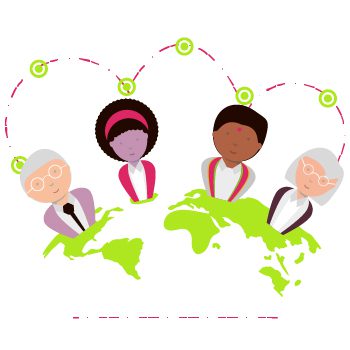
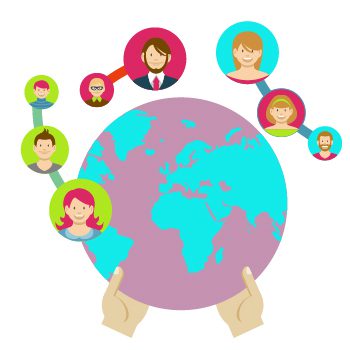
The Benefits of Cultural Exchange
Cultural exchange is the interaction and sharing of ideas, values, traditions, and practices between different cultures. This exchange has numerous benefits for both individuals and communities.
First and foremost, cultural exchange promotes diversity and understanding. Engaging with people from different cultures gives us a broader perspective of the world and a deeper appreciation for different ways of life. It helps us recognize our similarities and differences, breaking down stereotypes and fostering a sense of unity.
Furthermore, cultural exchange fosters personal growth and development. Interacting with individuals from different cultures exposes us to new ideas and ways of thinking. This exposure challenges our beliefs and encourages us to become more open-minded and adaptable.
The cultural exchange also enhances creativity and innovation. By drawing upon diverse perspectives, we can generate unique and groundbreaking ideas. Different cultural backgrounds bring fresh insights and approaches to problem-solving, leading to more innovative solutions.
In addition, cultural exchange strengthens social bonds and builds stronger communities. When we connect with people from different cultures, we form meaningful relationships based on mutual respect and understanding. This, in turn, leads to the formation of alliances and partnerships that benefit both individuals and communities.
In summary, cultural exchange offers a wide range of benefits. It enriches our lives, promotes understanding, encourages creativity, and fosters stronger communities. By embracing cultural exchange, we not only celebrate diversity but also create a more interconnected and harmonious world.
Promoting Mutual Respect and Understanding
Promoting mutual respect and understanding among different cultures is more important than ever in a world that is becoming increasingly diverse and interconnected. When individuals and communities take the time to learn about and appreciate other cultures, it fosters a sense of unity and empathy.
Promoting mutual respect and understanding involves recognizing that each culture is unique and valuable in its own right. It requires open-mindedness and a willingness to learn from others, embracing the idea that diversity enriches our collective human experience. Engaging in conversations and interactions with people from different cultures can break down barriers and bridge the gap between us.
Building relationships with people from different cultures also helps to break stereotypes and challenge biases. When we engage in meaningful conversations and truly listen to one another, we can better understand the complexities and nuances of different cultures. This leads to greater empathy and compassion as we recognize and appreciate the diversity of human experiences.
Promoting mutual respect and understanding also has practical benefits. It strengthens relationships and fosters collaboration between individuals and communities, allowing for exchanging ideas and perspectives. It also helps to create more inclusive and welcoming environments where individuals from all backgrounds feel valued and respected.
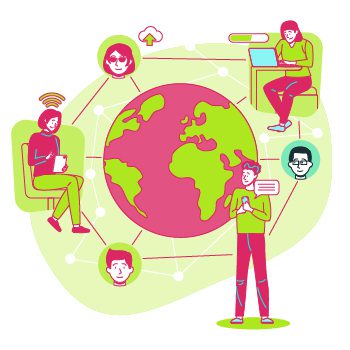
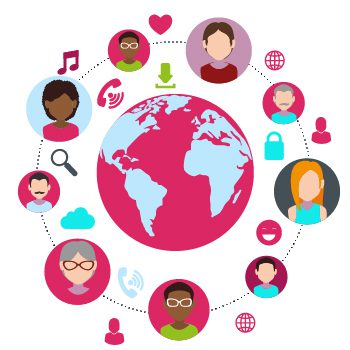
Preserving and Celebrating Heritage
Preserving and celebrating heritage is a crucial aspect of connecting cultures. Each culture carries unique traditions, customs, and practices from generation to generation. These traditions hold immense value as they link to our roots and offer a glimpse into a particular community’s rich history and identity.
By preserving heritage, we ensure that these valuable traditions and customs are not lost to time. It allows us to honor the efforts and sacrifices made by our ancestors to establish and maintain these cultural practices. Celebrating heritage also will enable communities to unite and showcase their identity to the world.
Furthermore, preserving and celebrating heritage allows for cross-cultural understanding and appreciation. When different cultures come together to share their traditions, it fosters a sense of respect and curiosity. People get to experience firsthand the diversity in our world and learn from each other’s unique perspectives.
Additionally, celebrating heritage plays a crucial role in shaping our collective future. It inspires innovation and creativity as people draw inspiration from traditional practices to create new and exciting art, music, and cuisine forms. It also strengthens community bonds by providing a sense of belonging and pride in one’s cultural identity.
Enhancing Innovation and Creativity
The connection of cultures is vital in enhancing innovation and creativity in our society. When people from different cultural backgrounds come together, they bring with them a diverse range of perspectives, ideas, and experiences. This diversity fosters an environment that encourages out-of-the-box thinking and the exploration of new possibilities.
Engaging with individuals from different cultures exposes us to different ways of thinking, problem-solving, and approaching challenges. This exposure opens our minds to new ideas and sparks creativity within us. It allows us to break free from the limitations of our cultural bubble and consider alternative perspectives and solutions.
Furthermore, connections of culture provide opportunities for collaboration and learning from one another. Through exchanging knowledge and ideas, we can combine the strengths and expertise of different cultures to develop innovative and groundbreaking solutions to complex problems. By building relationships with people from diverse cultural backgrounds, we can tap into a wealth of knowledge and creativity that we may not have access to otherwise.
Moreover, embracing cultural diversity also challenges us to question our assumptions and beliefs. By being exposed to different ways of thinking, we become more open-minded and willing to challenge conventional wisdom. This willingness to question and explore different perspectives is crucial for fostering innovation and pushing boundaries.
Building Stronger Communities
One of the critical benefits of connections of culture is the ability to build stronger communities. When different cultures come together, they bring a wealth of knowledge, experiences, and perspectives that can enrich the community fabric. By fostering relationships and connections with people from diverse backgrounds, communities become more inclusive and welcoming.
When individuals from different cultures interact, they often form deep and meaningful connections that go beyond superficial interactions. This human connection and emotional bond is a foundation for trust, understanding, and collaboration. People can learn from each other, share their stories, and develop a sense of empathy and respect for one another.
These connections of cultures also promote the idea of a collective identity, where individuals see themselves as part of a larger community rather than isolated individuals. This sense of belonging strengthens social cohesion and solidarity, making communities more resilient and supportive. It creates an environment where people are willing to lend a helping hand, support one another, and work together towards common goals.
Moreover, connecting cultures leads to forming alliances with people from different backgrounds. These alliances can result in increased cooperation, knowledge sharing, and collective problem-solving. By embracing diversity and embracing a strong culture of inclusivity; communities can tap into the potential of every individual and leverage their unique skills and talents. Read more about language diversity.
Fostering Cultural Sensitivity in Daily Life
Cultural sensitivity involves recognizing and respecting the differences and similarities between cultures without assigning them value judgments. Integrating cultural sensitivity into daily life can significantly enhance interpersonal interactions and reduce misunderstandings. By being aware of cultural norms and practices, individuals can navigate social situations more effectively and respectfully. For instance, understanding greetings, dining etiquette, and communication styles can help foster positive relationships and prevent inadvertent offenses.
Language barriers often pose challenges in cross-cultural interactions, but cultural sensitivity can mitigate these issues. Learning a few key phrases in another language or using visual aids can bridge communication gaps and demonstrate respect for the other person’s culture. Additionally, being patient and open-minded when encountering language barriers can help build trust and rapport. Practicing cultural sensitivity in everyday interactions not only enriches personal experiences but also contributes to a more inclusive and harmonious society.
Understanding and Adapting to Cultural Norms
Understanding cultural norms is essential for effective communication and collaboration in a multicultural environment. Cultural norms encompass the behaviors, values, and customs that are considered acceptable or typical within a particular group. By learning about these norms, individuals can avoid cultural faux pas and show respect for different ways of life. This understanding is especially important in professional settings, where cultural missteps can impact teamwork and productivity.
Navigating cultural norms often involves recognizing and adapting to different communication styles, such as indirect versus direct communication. Awareness of non-verbal cues, such as gestures and body language, can also enhance cross-cultural understanding. In addition, addressing language barriers by using clear and simple language or employing translation services can facilitate smoother interactions. By prioritizing the understanding and adaptation of cultural norms, individuals can create more inclusive and cooperative environments, whether in the workplace, community, or daily life.
FREQUENTLY ASKED QUESTIONS
How does the connection of cultures enrich society?
The relationship of cultures enriches the community by bringing together a wealth of knowledge, art, music, cuisine, and customs. It encourages cultural exchange, leading to innovations, creativity, and a vibrant social fabric.
How can cultural exchange improve global relations?
Cultural exchange improves international relations by fostering a sense of empathy and interconnectedness among different societies. It builds bridges of communication and paves the way for peaceful interactions and collaborations.
Does the connection of cultures enhance learning opportunities?
The relationship between cultures enhances learning opportunities by exposing individuals to diverse perspectives and ideas. It broadens one’s understanding of the world and encourages a lifelong pursuit of knowledge.
What role does cultural awareness play in connecting cultures?
Cultural awareness is essential in connecting cultures as it promotes sensitivity and respect for cultural differences. It helps avoid misunderstandings and misinterpretations, fostering meaningful and genuine connections.
How does the connection of cultures impact the arts?
The relationship of cultures influences skills by inspiring new forms of expression, blending artistic styles, and creating collaborative projects. It results in a rich tapestry of global art that reflects the beauty and diversity of humanity.
